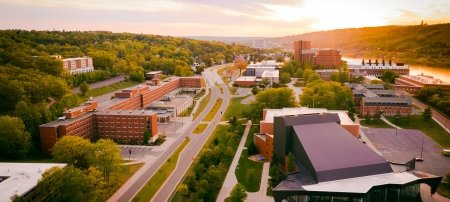In this guest blog, the Department of Kinesiology and Integrative Physiology shares some backstory behind the student-produced video “Staying Healthy and Safe During COVID-19.”
“Be Smart. Do Your Part.” has been the motto here at Michigan Tech since the start of the COVID-19 pandemic. A team of graduate students in the Department of Kinesiology and Integrative Physiology (KIP) did just that. The team — Xinqian Chen, Isaac Lennox and Carmen Scarfone, led by doctoral student Ashley Hawke — created the video “Staying Healthy and Safe During COVID-19” to provide updates on latest COVID-19 trends, recommendations on how to stay safe, travel tips and strategies to maintain physical and mental health.
The two-minute video stresses the importance of relying on information from credible sources, such as the Centers for Disease Control and Prevention, state and local health departments, educational institutions and non-biased news sources. It offers a COVID-19 snapshot and has been circulated on campus. Off campus, the video has been featured in the Daily Mining Gazette and on ABC 10 TV. It has also been shared through the Western Upper Peninsula Health Department, the Copper Country Strong website, the U.P. COVID-19 Town Hall series, and the Frontline UPdates Joint Information Center social media pages.
With Michigan COVID-19 cases and hospitalizations recently reaching an all-time high and increased concerns surrounding the new omicron variant, communication of health information to help keep our campus and community safe and healthy is critical. Rural communities continue to face challenges, as they typically have a limited number of medical providers, hospital services and public health resources compared to urban communities. “These students leveraged their broad-based training in health science to contribute to the COVID-19 response in their community,” explained Steven Elmer, KIP associate professor and graduate program director.
Elmer also emphasized that the students’ video was part of a class project aimed at responding to the U.S. surgeon general’s advisory statement to “Build a Healthy Information Environment.” The advisory statement tasks educators, researchers and professionals to confront misinformation and help improve the quality of health information so community members can make informed decisions about health for themselves and their family and community.
The graduate students behind the video hail from Michigan, Canada and China. Lennox, a master’s student striving to become a physician specializing in family medicine and rural health, explained that the team also created a COVID-19 resource webpage, along with a bimonthly COVID-19 infographic for KIP students, staff and faculty. With the rapidly evolving nature of the pandemic and amount of misinformation circulating, it can be difficult to keep up and stay informed. The student team collaborated with Kelly Kamm, an expert in infectious disease and epidemiology and KIP associate professor, to ensure the accuracy of all materials created.
To stay safe during this pandemic, especially with the upcoming holiday season, the students encourage everyone to get vaccinated and get a booster shot if you are already vaccinated. They also recommend following the four W’s whenever possible — wear a mask, wash your hands, watch your distance and walk to stay physically active.
Looking ahead, the team will continue to do their part and use their expertise to help both the campus and community. As future health professionals, they want to learn as much as they can from the current pandemic so they are better prepared to lead during the next one.
Michigan Technological University is an R1 public research university founded in 1885 in Houghton, and is home to nearly 7,500 students from more than 60 countries around the world. Consistently ranked among the best universities in the country for return on investment, Michigan's flagship technological university offers more than 120 undergraduate and graduate degree programs in science and technology, engineering, computing, forestry, business, health professions, humanities, mathematics, social sciences, and the arts. The rural campus is situated just miles from Lake Superior in Michigan's Upper Peninsula, offering year-round opportunities for outdoor adventure.





Comments